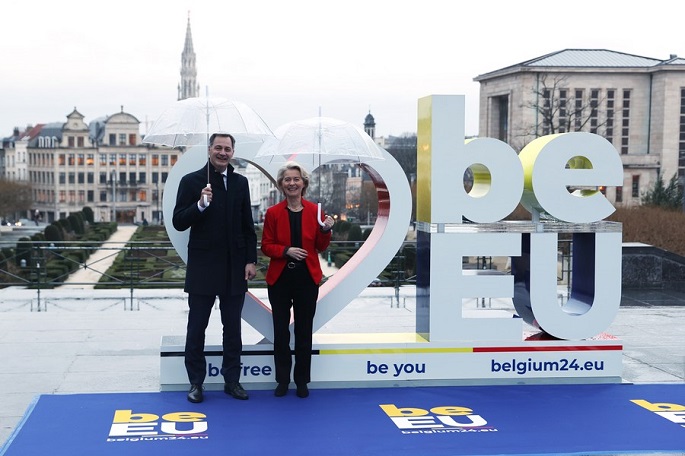Mounting challenges ahead as Belgium assumes EU Presidency
Published : 15 Jan 2024, 22:27
Updated : 15 Jan 2024, 22:30
Belgium has taken over the Presidency of the Council of the European Union (EU) for a challenging six-month term in 2024, reported Xinhua.
The road ahead is no easy feat, with the European Parliament entering an election period in June, intensifying the urgency for the presidency to conclude numerous legislative dossiers.
Belgian Prime Minister Alexander De Croo revealed in December that around 150 legislative dossiers are on the table, a point reiterated at the official presentation of the program for the Belgian Presidency of the Council of the EU.
In its 13th rotation in this crucial role, the country has outlined six key priorities. At the top of its agenda are finalizing the EU's migration pact, advancing the green economic transition and reaching an agreement on a new EU aid package for Ukraine.
However, Belgium faces a bumpy start, overshadowed by European Council President Charles Michel's sudden announcement to step down early to run in the European parliamentary elections.
This presents an additional hurdle, requiring negotiations for a new EU Council President before July. Otherwise, Hungarian Prime Minister Viktor Orban may temporarily assume the position after Belgium's term.
Another significant challenge for Belgium will be conducting talks with the 27 member states on defining new rules governing their budgetary discipline. The mid-term review of the EU's 2021-2027 multiannual budget and the EU support project for Ukraine, involving a 50 billion euros (54.73 billion U.S. dollars) facility for the period 2024-2027, are also on the agenda.
"The project to support Ukraine is a priority for the EU," Ursula von der Leyen, president of the European Commission, said at the inauguration of the Belgian Presidency. However, there is contention among EU leaders regarding the inclusion of this project in the mid-term review of the EU's multiannual budget, resisted by Viktor Orban.
To address this issue, von der Leyen urged Belgium to transform its position on this matter into a political decision as quickly as possible, with an eye on the extraordinary European summit on Feb. 1.
Another major challenge for the Belgian EU Presidency is finalizing the EU's asylum and migration pact and ensuring its application in all the member states.
Hungary abstained from voting on the pact at the European summit in December, with Orban stating that his country would not accept refugees on its soil.
At the heart of the Belgian Presidency's agenda will be the regulation of clean industry and new budgetary rules for the EU member states to stimulate investment.
Preparing for future EU enlargements is also on the Belgian agenda, with accession negotiations open with Ukraine and Moldova and candidate status granted to Georgia in December 2023. Belgium aims to drive these issues forward, acknowledging the process will be lengthy.
In his political action, De Croo stated at the inauguration of the Belgian Presidency that "anticipation and strategic planning will be the Belgian pillars in all spheres of EU action." This also refers to the need for internal reform of the Union to preserve its capacity for future action, he added.


